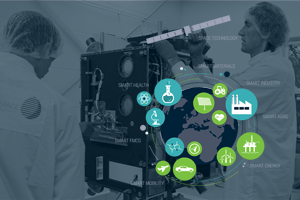The space industry is poised for explosive growth, and corporations are already partnering with start-ups to tap into new markets and technologies. A major facilitator is the CASSINI Business Accelerator, a European Flagship project designed to support space entrepreneurship in the EU executed by the Open Innovation team at Verhaert (OpenLab). The accelerator has just reached its first milestone: Over 140 applicants for 20 prime spots in the acceleration program. It’s clear that we’ll be building a broad ecosystem that both start-ups and large corporations will be benefiting from.

Context
In all the excitement, it’s easy to forget that not everyone’s aware of the activities at OpenLab and what CASSINI actually is. So here is a quick recap and update for all our new readers:
What is OpenLab?
OpenLab is a division of Verhaert that focuses on creating multi-sided collaborations with universities, governments and other companies. A specialty of the team is supporting start-ups in the space tech scene from early stage to scale-up. This is however only a small task, as the team also focuses on technology transfer, utilizing tech from high-tech areas (fusion, space, and hopefully soon other domains as well) for products in other markets, and climate change resilience for governments. In short, OpenLab is a gateway for projects and innovation on company overarching topics to take place.
What is CASSINI?
The CASSINI Initiative (not to be mistaken for the CASSINI satellite from NASA that explored Saturn) is in essence the European (Commission’s) strategy for supporting new entrepreneurs in the space industry. It compiles lessons from past programs into a single, simple, clear strategy for European space tech entrepreneurship.
Innovation within the accelerator
The CASSINI Business Accelerator focuses on the more mature start-ups that already have a demonstrator on the market and are ready to build more business scaling teams. The challenge these space start-ups often face is that they remain within the engineering story and have difficulty transitioning from a technology builder to a product or service-selling company. This means having nailed down all processes from marketing, sales, communication and supply chain management, to production, assembly, QA and logistics. And that’s exactly where we offer support during the accelerator. Besides these internal processes, we also focus on getting to know the ins and outs of public buyers in other countries. Because let’s be honest, you can’t just grow you company by selling to your national government (not in Europe at least).
Connecting start-ups with large corporations
This program envisions generating sales and thus includes connecting to large corporations and understanding their needs, requests and partnership conditions. Here, we see different possibilities for both corporates and start-ups and how they can learn from each other.
1. Benefits in pushing pricing strategy
Start-ups, as they mature, need reliable suppliers that are accustomed to price discussions and production excellence improvements. Many larger space companies have been providing ESA-standard high-quality parts. Why should they not deliver similar subcomponents to start-ups but at a lower price? See how these start-ups push your own sales, operations and delivery processes to lower the cost and improve margins. Many existing space companies have embraced this approach already and as start-ups scale increase, volumes could be achieved previously unheard of.
2. Benefits in production management
Additionally, some start-ups might benefit from high-quality production management, project management approaches already well in place in industries like the automotive industry. For too long, the space industry has considered delays in delivery to be part of the way of working. In contrast, any day of delay entails hefty penalties within the automotive industry. The processes installed to make sure this doesn’t happen could be a new breeze in the processes of a (space) start-up trying to scale. Hence a consulting agreement with a non-space production company could be interesting to learn about these processes. Think of:
- BMW assisting Veoware/ Aerospacelab for the production
- Airbus (aviation division) for Isar Aerospace
- SAP and Spotify’s fast feature teams for Leanspace
- Viso.ai for earth observation start-ups
3. Benefits in co-development
A step further is co-development: a mutually beneficial agreement in terms of revenue sharing and IPR, building on the strengths of each of the teams and possibly in the facilities in place in larger companies.
4. Benefits in product scaling
Not to neglect is the current consolidation wave in the space ecosystem. The CASSINI Business Accelerator will bring forth some of Europe’s strongest scaling space companies. Others might need the (production) scale of a larger organization to achieve that growth. The benefit is mutual: Corporate venture teams could apply to the accelerator for further scaling, and M&A divisions could be interested in currently more independent teams looking to achieve scale.
We are researching these multiple points and looking forward to building bridges between industries to grow an intertwined network to in the future constitute a true space industry. If this has sparked your interest, our team is happy to take this further.




